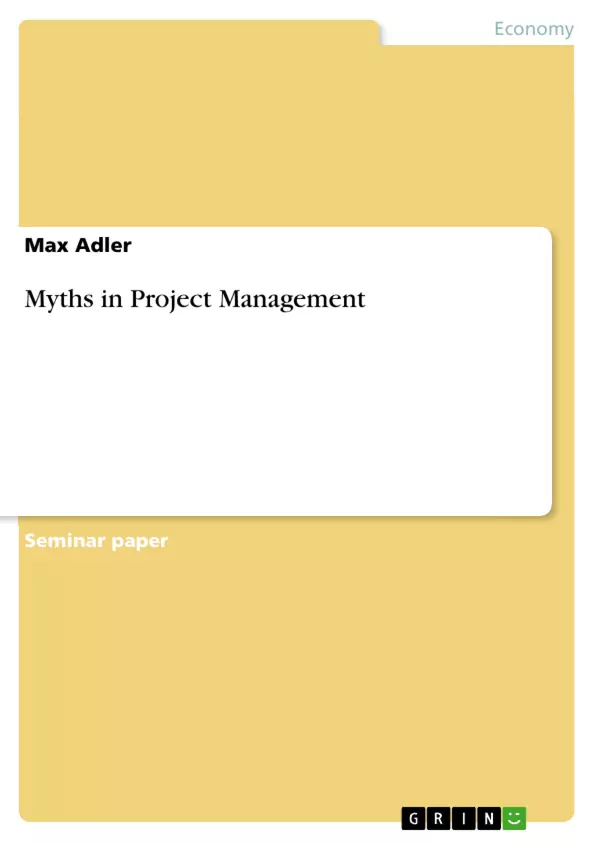1 Introduction
The term project management stands for the assumption that a project has to be successful. There are managers who think if they use the technique of project management, they have a guarantee for success. It is obvious that every structural work which is done by the use of experience and knowledge is even better than a work which is done by the caprice decisions of one person. A project will fail without project management, but the converse assumption is neither correct.
One of the reasons why projects fail in spite of project management is that there are various myths which make managers believe they are doing well their work, but with a critical analysis they would realize that they can improve it. This piece of work analyzes the most common myths within the project environment. Most of these myths can be identified as manage-ment mistakes caused by superficial knowledge and subjective assump-tions without scientific evidence.
But why there are so many myths? Why do not project managers realize the mistakes they make? On the one hand project management is a young discipline in the economy. The first project management tools were developed in the 1950s. Therefore companies do mistakes because of missing preferences (Maylor, 2003, p.6-7). But one the other hand managers make not realize mistakes because of coincidences. If a project succeeds because the worst case did not come along, the executive manager often thinks that he did all right and he is going to plan another project in the same way with the same mistakes. With the right techniques and risk management one can decrease the possibility that a project fails a lot. Nevertheless they do not know if they will have success but they can minimize risks in avoiding common myths which are analyzed by this piece of work.
Table of Contents
- 1 Introduction
- 2 Myths
- 2.1 Time planning
- 2.2 Planning and Feasibility
- 2.3 The human factor
- 2.4 Repetition always works.
- 3 How to avoid a myth..
- 4 Conclusion
Objectives and Key Themes
This paper aims to analyze common myths in project management and demonstrate how these myths can lead to project failure. The paper explores the reasons behind these myths and provides practical suggestions on how to avoid them. The main themes addressed in this paper are:- The myth of time planning and its impact on project success
- The myth of comprehensive planning and its relationship to flexibility
- The importance of considering the human factor in project management
- The myth of repetition and its relevance to project success
- The importance of critical analysis and avoidance of myths in project management
Chapter Summaries
1 Introduction
This chapter introduces the concept of project management and its inherent assumption of project success. It highlights the fact that while project management techniques can be beneficial, they do not guarantee success. The chapter emphasizes the prevalence of myths within project management and their potential to lead to project failure. It argues that these myths often arise from superficial knowledge and subjective assumptions without scientific evidence.2 Myths
This chapter delves into specific myths commonly encountered in project management.2.1 Time planning
This section focuses on the myth that projects consistently run out of time, regardless of planning efforts. It explores various factors contributing to this phenomenon, including poor planning and the horror vacui effect. The importance of realistic time scales, including buffers for potential delays, is emphasized. The chapter proposes a structured approach to time estimation, incorporating three time units (best case, normal procedure, worst case) for each task to mitigate the impact of delays.2.2 Planning and Feasibility
This section examines the myth that detailed project plans with numerous tasks are always superior to more flexible plans. It argues that excessive detail can hinder adaptability and that a balance between planning and flexibility is crucial. The chapter acknowledges the importance of clear objectives, risk assessment, and staff reliability in achieving project success.3 How to avoid a myth..
This chapter, unfortunately, is not included in the provided text for analysis.4 Conclusion
This chapter is also not included in the provided text due to the policy of avoiding spoilers.Keywords
Project management, myths, time planning, planning and feasibility, human factor, repetition, project success, critical analysis, risk management, time scales, buffers, flexibility, objectives, staff reliability, horror vacui effect.Frequently Asked Questions
Does project management guarantee success?
No. While techniques help, many projects fail due to common myths and management mistakes based on subjective assumptions.
What is the myth of time planning?
It is the belief that projects will always run out of time regardless of planning, often caused by the "horror vacui" effect and lack of realistic buffers.
Is detailed planning always better?
The paper argues that excessive detail can hinder adaptability; a balance between structured planning and flexibility is crucial.
What is the suggested approach for time estimation?
Using three time units for each task: best case, normal procedure, and worst case to mitigate delays.
Why do managers often repeat mistakes?
If a project succeeds by coincidence (e.g., the worst case didn't happen), managers may mistakenly believe their flawed planning was correct.
- Citar trabajo
- Max Adler (Autor), 2010, Myths in Project Management, Múnich, GRIN Verlag, https://www.grin.com/document/150712



